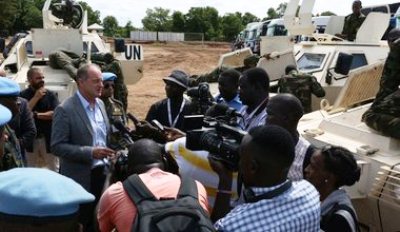Regional forces will not control S. Sudan airport: UN chief
August 16, 2017 (JUBA) – The head of the United Nations mission in South Sudan, David Shearer has clarified that it will be the mandate of the government and not the regional protection forces to control the airport and other key installations in the war-torn country.

He added, “There is absolutely no designs or plans of any kind to take control of the airport. Quite the opposite, the airport is the sovereign right and sovereign property of the government of South Sudan”.
According to the top UN official, the mission has already started some patrols up and down the road linking South Sudan’s town of Nimule to Uganda and that connecting the capital, Juba to Bor.
Shearer said the deployment of the troops will allow the mission to reorganize and put to proper use the troops, including the provision of regular patrols.
“These are two vital lifelines for South Sudan. The deployment of the RPF (Regional Protection Force) means simply that we have additional troops at our disposal that can make more frequent patrols along that road in addition to the possibility of escorting some vehicles along the road as well,” stressed the UN mission head.
“We hope that that presence will make the road safer and enable the free movement of people along that road without any problems”, he added.
The protection force, the official further told reporters, would be based in Juba, allowing the mission a freedom for other forces to move out to hotspots that require more in the way of protection.
In August 2016, the UN Security Council, following a request by the East African regional bloc, the Intergovernmental Authority on Development (IGAD), approved the deployment of a 4,000-strong protection force to secure Juba in the aftermath of renewed clashes.
South Sudan’s Transitional Government of National Unity confirmed its unconditional consent to the deployment of the force in a communiqué to the Security Council on November 30, 2016.
The 4,000-strong force is meant to protect civilians from the gang rapes and other abuses seen during the fighting that erupted in the capital, Juba, a year ago. This additional force would beef up the existing 13,000-strong UN peacekeeping troops.
South Sudan’s civil war has killed tens of thousands and displaced over two million civilians in less than five years, according to the UN.
Last month, South Sudan government said it had completed the verification needed for regional protection forces to be deployed in the country. Weeks later, the first batch of regional protection from Rwanda arrived in Juba.
(ST)
